|

A single stem of lady's tresses (Spiranthes lacera)
in Washington Co., KY
(*photo
credit)
September 1, 2009 Seventy
Years Ago: The Second World War
The ranks of those of us
who remember the start of the Second World War are thinning now.
In fact, I remember that infamous September first, not because it
was the day Germany invaded Poland, but because on that Friday my
mother took me to a half day of school; this was my first day of
school -- and the teacher was Sister Imogene, who lived to be 103
and died four years ago. Over that weekend in 1939, Great Britain
and France declared war on Germany, and the conflict quickly
expanded to include a major portion of Europe. As the war
progressed and was discussed by my family and relatives, I listened
to their conversations and to radio news reports as well. By the
third grade, I was reading the daily newspaper in order to glean war
information.
That Second World War was
bloody: an estimated 50 million fatalities. People died in
concentration camps, on the Russian front, in air raids, and in
fighting on land and sea. By the time the Americans entered this
conflict in December, 1941, the fighting was waging across Europe,
Asia, and Africa and even approaching Australia. In retrospect, we
appreciate the anguish experienced by so many, both those in the
military and loved ones far from harm's way. Here at home, the
rationing of gasoline, tires, sugar, and other items made us acutely
aware that others were undergoing a supreme sacrifice an ocean away.
With the fading hopes of
the First World War to end all wars and the subsequent Great
Depression, the people were somewhat realistic. We have to earn
what we get. Evils arise and must be confronted; this takes
effort; we simply have to learn to become cooperative and not exact
reparations from down-and-out defeated people. On the local level,
folks helped each other out during the labor shortages; the school
kitchens became summer canning centers; the gold stars on front
windows meant a loved one had died fighting. At the international
level, the heads of states were having meetings. They were talking
of a United Nations to replace the toothless League of Nations.
Even through those dark days, a slender silver lining of global
cooperative efforts towards world peace was beginning to appear.
September first was not a
day to celebrate as was the end of the conflict on May 8, 1945, in
Europe and August 15, 1945, in Asia. This September while we fight
two wars (the longest span of war in our history) we are reminded
that armed conflicts come with the terrible suffering of displaced,
abandoned, maimed and terrified people in many places. Only after
that war did my family find out that our cousins in Alsace were
forced on September 1, 1939, to undergo part of the largest
evacuation ever undertaken by the nation of France. Nor did we know
until after the war that the home town was devastated in the last
months of fighting (the winter of 1944-45 by American liberating
forces). These events were only a few of many of similar episodes
that began in September, 1939.
Prayer: Lord, make us a peaceful people who detest war.
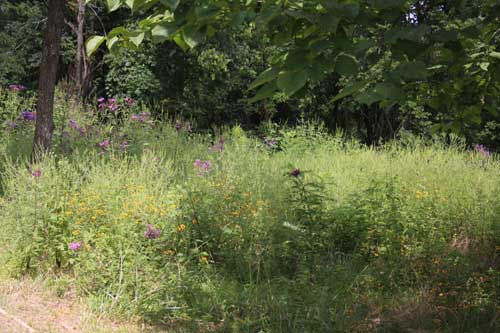
Lushness of late summer into early autumn
(*photo
credit)
September 2, 2009
Autumn Gardens Can Be Productive
Most budding gardeners will
say that you plant gardens in the spring and harvest them during the
summer. Few even consider fall gardens -- and that is a mistake.
Certainly being blessed by rain, as has occurred this year, can make
the autumn sowings and plantings easier. As we experience the
phenomenon of later and warmer autumns, we should make climatic
changes opportunities for producing vegetables and herbs through the
remainder of calendar 2009. Seasonal extenders (greenhouses and
cold frames) can certainly help, except for the most sensitive cool
weather crops (beans, tomatoes, melons, peppers and cucumbers).
* Choose vegetables that
can thrive in cool weather: kale, kohlrabi, turnips, radishes,
mustard, collards and endive. In most cases, moisten the seeds just
before planting and keep the rows or beds damp, in order to jump
start the plants. The early stages always need moisture and tender
loving care. Remember that some weeds experience a late summer
growing spurt as well, and will compete with the newly sown beds or
rows.
* Assist with seasonal
coverings to accelerate the growth. Now is the perfect time for
cold frames and coverings that conserve the warm daytime atmosphere
well into the night. As always, much depends on the weather; a dry
summer that continues into autumn is very difficult to manage. Also
much depends on watering devices, which could prove quite worrisome
for the non-professional gardener. Be willing to nurse the new
plants along under dry, late summer conditions.
* Set a goal of fresh
vegetables throughout the season and anticipate fresh greens and
root crops that will fill the table with fresh salads even after
frost. This anticipated goal allows us to move forward with
determination, especially by early September. It is our last
chance. If planting in rows, then a certain amount of mulching is
recommended as well as frequent irrigation. New plants take much
water and so, if the season is dry, cut down on the amount of space
devoted to each autumn crop and stick with those requiring less
moisture such as collards, and avoid the sensitive ones such as
lettuce. In autumn, plants will not bolt or go to seed as fast as
in springtime. Thus the spring vegetables may do better in autumn
in some of our climates.
* An added measure is to
extend the growing season of the summer crops as late as possible by
covering them when low temperatures or frost are predicted. If well
protected, cherry tomatoes and green and hot peppers can produce
well into the autumn. Well mulched root crops such as carrots,
turnips, beets, Japanese radishes and onions will remain in good
condition, even under adverse moisture and temperature conditions.
Just don't say "it's too late." Start now; activate the verb, to
"fall-garden."
Prayer: Lord, teach us to see adverse conditions as challenges and
opportunities to produce good things.
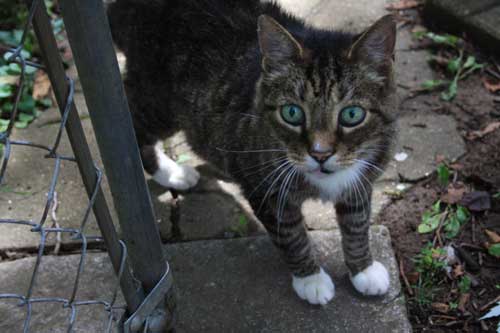
Tony, a very curious kitty
(*photo
credit)
September 3, 2009 Support
Single-Payer Health Insurance
This daily reflection site
is not known to endorse specific legislation. However, an issue is
now facing Congress, which is a major moral issue, demanding that
people speak out, namely in favor of single-payer health
insurance. Today, the American health issue is occupying the
minds of many of our citizens. We have witnessed in the past month
a massive infringement on our rights as a democratic people; namely,
lobby groups of health insurance and pharmaceutical companies have
financed a supposed "opposition" to confront elected legislators at
town hall meetings throughout the country. Hecklers have not
allowed legislators to speak and define their positions on health
issues.
Why has this happened? It
is not because a single-payer plan (similar to Medicare) is a
bad policy. It addresses the major demand for citizens who opt for
a universal health care by an overwhelming majority. Surprisingly,
all want every American covered by health care; the great majority
(59% by Grove Insight Opinion Research) support government-run
health insurance. The administrative costs of doing this through a
single-payer program are cut dramatically and make the program
doable, as with Medicare (a single-payer plan), which is run
efficiently through the federal government. The advocates of
private plans show total inconsistency, because, under Medicare,
people can still choose their doctors and their treatments. The
opposition does not have a better plan. Their proposals (if they
have any) would just be more profitable to the health insurance
industry, as is well known. But why should companies make massive
profits off of our health?
The public must have a
right to know and hear the opinions fairly and dispassionately --
and this has not been the case even throughout August. Do not
forget that earlier this year in hearings, the single payer
advocates were so side-lined that thirteen were arrested for wanting
someone of their number to speak in congressional hearings. Public
Citizen's Dr. James Floyd said, "By excluding single-payer
supporters from hearings throughout the year, Congress showed that
protecting the profits of the insurance industry was more important
than providing quality health care for all Americans." Public
Citizen, July/August, 2009, p.6
As the summer has worn on,
some of the single-payer people have been allowed to speak at one
senate and two house panels. But the major bills now being put
forward do not reflect their recommendations, which are termed
"socialistic" by the naysayers. A single-payer plan saves precious
funds, and reduces the combination of private and public bureaucracy
expenditures by hundreds of billions of dollars each year. A more
middle of the road "public plan," with stronger backing by moderate
democrats, would not realize nearly that much in savings. Do
something!
Prayer:
Lord, when it comes to all aspects of healing our Earth, help us to be
fair, to allow all sides to be heard, and to
choose procedures that are to
the benefit of all people.

Find the spider... White phase of the crab
spider, family Thomisidae
(far right, clinging to blossom)
(*photo
credit)
September 4, 2009
Prisons, Justice and Balancing Budgets
In proportion to
population, the United States has the highest incarcerated rates of
any developed nation, and very high among all nations. In the past
quarter of a century, the number of federal prison inmates went from
20,000 to 135,000; inmates in state prisons from 268,000 to 1.3
million; and inmates in local jails increased another 700,000. At
the time of writing an astounding 6.5 million Americans are under
some form of correctional supervision -- though California is giving
early release to some due to its financial crisis. Is it cheap
labor that drives turning our country into a Gulag? Or it is an
outmoded concept of jail?
At an average cost of
$30,000 (some places it is $35,000) per prisoner per year, doesn't
it make financial sense to put these unfortunate souls on service
release as quickly as possible? Can't they live at home while
monitored at a far lower price than in a correctional institution?
Let them do the cleanup and repair work so desperately needed to put
the infrastructure of this country back into shape.
Adding to this, when
speaking of prisons and justice, is that we are one of the few
civilized nations that still retains the "death penalty." Sister
Helen Prejean, an anti-death penalty crusader, accompanied Patrick
Sonnier to his execution. That episode inspired her book, Dead
Man Walking, which has done much to make us reexamine our
American criminal justice system. Prisons confine people in
life-denying institutions which can dehumanize the individual.
Primitive people have less costly ways to exact retribution for
misdeeds committed, including working within society. True, some
life-giving efforts are being made even within the American prison
system. Catherine Sneed, a volunteer, tells of improving her own
prison work by developing a horticulture program at the San
Francisco County Jail. In taking care of plants, prisoners began to
understand the true nature of this life: growth, renewal and
perseverance. The same experience occurs when prisoners are part of
a seeing-eye-dog training program.
Any of us who are
volunteers, or do contracted services, at prisons know that the
establishments ought to be smaller and many of the incarcerated
could be gainfully employed in communities rather than cloistered
behind prison walls. However, this crusade is not proper or
possible within the institutions; it must be done by those citizens
on the outside who can help influence legislators to institute
changes. "Three strikes and they are out" is about as insane a rule
as ever devised. And it is utterly costly to the unfortunate
prisoner and doubly burdensome to the taxpayer. We need to be
watchful of how government money is spent, and literally billions of
dollars could be saved through a non-prison public service program.
Inform your legislators!
Prayer: Lord, give us the grace to effect change so as to
liberate prisoners for the
opportunity to do community service.

Lovely begonias, nature's perfect work of art
(*photo by
Sally Ramsdell)
September 5, 2009
Encourage Artists and Artisans
Next Monday is Grandma
Moses' birthday, and her life gives us the courage to say we all can
be artists or artisans -- to some degree. At least, if beauty is in
the eye of the beholder, and if we see the work of our hands as
producing a beautiful product, we can call our work "art." This is
regardless of what the critics say. We all have noble aspirations,
and an innate desire to be creative. It may be in painting,
sculpture, architecture, designing, cooking, metal-working, weaving,
knitting, gardening, or a hundred other things. My dad liked to
make wooden carvings, something he started as a youth and suspended
during middle life. Many in our home town agreed that he had become
a master of his primitive art in his senior years. My mother
regarded her flower garden as a work of art, and she inspired many
of us to seek to express our inmost aspirations through crafts and
arts.
Appalachian people are
quite creative and are drawn to crafts and arts in free time, and
especially after so-called retirement. They believe that a major
ingredient of successful art is the selection of materials, and ways
to arrange them so as to bring out particular expressions not
commonly observed. The individuality of this Appalachian primitive
art is what is so striking and enduring. In some ways, a rigid
structuring of the art forms that these people practice would most
likely destroy their creative urges, and reduce them to mechanical
workers. That is why the quilter should decide the pattern of a
quilt, not outside marketing experts who attempt to impose their own
designs.
It is humorous when an
unknown work of "art" has been decorating a place, and suddenly
experts decide it is painted by a famous person -- and the price
goes from nearly nothing to millions. Really? Is art honored or
desecrated? The opposite occurs when a supposed priceless work is
found to have been created by an unknown -- and loses its value.
Doesn't such rise and fall in prices indicate capitalistic trading,
not art? Looking about, we find in our region art appreciated by
both the artist or artisan AND others. Creators have the courage to
go public, and patrons have the courage to patronize without respect
to the commercial value.
The public display of one's
expression is like a word spoken for the first time; it expresses
what is inside, and it invites observation and judgment. Acceptance
is another matter. A comment like, "Well, if that is the best one
can do, don't waste the paint," is cruel; this is most likely an
expression of a repressed artist afraid of going public. One's art
may not be ready for an art show or a museum. Even if unrecognized,
it still decorates one's room, house, yard, outbuilding, or roadside
display. It is meant to add beauty. Appalachian people often
decorate with personal ornaments. They break the bonds of
non-professionalism and expose the artist within. Let's hope more
show their art.
Prayer: Extend your creative hand to us all, Oh Lord, and let us recognize it
and make our own creation for your greater glory.

Heal-all, Prunella vulgaris
(*photo
credit)
September 6, 2009 We
Must All Be Healers
Did not God choose those
who were poor in the eyes of the world to be rich in the faith....
(James 2:5)
James tells us that we are
not to show favoritism, and this applies to those who are more in
need of our care and service. We know people who dote over someone
who needs help; at the same time the same caregivers simply
overlook others. Becoming caring people, a needed ingredient to
earthhealing in all its forms, requires a universal sense of caring,
not a fixation on an individual case. However, we know that some
caregivers have limited time and energy, and thus must focus on the
needs of certain people at certain times. An ability to both focus
at a given moment, and cultivate a more general "catholic" outlook,
takes a special grace. James is one who understands the challenge.
We cannot overlook or dismiss the sick person who confronts us. In
order to be profound healers we must be unbiased and determine where
the greater need must be met.
Insensitivity and
favoritism make the healing process quite skewed in this age of rich
and poor. A rich person with a major ailment is in need of care; so
is a poor person with the same ailment. Is it right to divert all
attention to the rich person, and ensure that he or she is not
overly taxed or economically affected by a more universal health
care system? Are not both
rich and poor in need of
healing, and economic status should not be the determining factor.
Affordable health is a concern of each and every citizen -- and we
all must be healers and must be healed.
In today's Gospel passage
(Mark 7:31-37), Jesus knows the poor man cannot communicate
because of deafness and a speech impediment. Jesus heals him openly
by touching the ears, making spittle for application to the tongue,
and looking upward in prayer. The individual responds in faith, but
the audience is challenged to also come to faith; their amazement
goes beyond all bounds. Jesus initiates a process in which we are
also to make those who have no audience (essentially mute) speak of
their own needs. Through public signs, Jesus opens the way for
deeper spiritual transformation; we are to respond by being
transformed into assisting those who need healing in any manner.
We are part of the Body of
Christ, now called to heal this troubled world. Some of us dispense
healing sacraments; others help reconcile the divided and heal past
wounds; others are direct caregivers for the sick; some research new
healing procedures; all are called to help make normal healing
procedures affordable to all citizens. The more ultimate goal
is to make this healing mandate apply to an entire world. This is
a greater challenge, but by diverting one tenth of the current
military budget to direct human health problems, money for essential
global healing could be found.
Prayer: Lord, strike us with the mandate to help heal this broken world, and
give us the grace to respond with open hearts.

A lone deptford pink (Dianthus armenia)
(*photo
credit)
September 7, 2009
Labor Day and Joblessness
Labor Day ends the vacation
period and is celebrated. However, this year we are aware that many
workers are forced to combine their past tasks with those of a
now-laid off fellow worker -- or they will be replaced by others
more willing. Harassed workers who object may receive a pink slip.
Today with unemployment hovering around 10% in this country and
higher in some countries, we need to look at current labor
conditions once again.
I have always enjoyed
working. From earliest times on the farm, we learned the dignity of
work, from those who enjoyed working and were proud of the products
of their labor. However, for many, forced labor or bad labor
conditions tarnish that ideal approach to labor. It is best to
speak of labor freely undertaken or contracted, and labor regarded
as worthy of achieving results for the benefit of the individual,
family, and/or community. Perhaps half the world's workers are
tolerant of or even like the work they are doing. They find joy in
a job well done, and are thankful that they have jobs to support
their families.
Today, during this serious
downturn in most parts of the world, millions of jobs have been
lost. In this country one-tenth of those seeking employment are
jobless -- and that does not count those who have given up looking.
Many of these people are desperate for work; they would gladly call
whatever job they could get "dignified" in order to provide a
livelihood. In this downturn, many retirees seek to return to work
because their pensions are not sufficient to meet daily needs.
It is truly undignified to
have no work when one needs it. Our country calls for citizens to
show responsibility and to serve their country in need; it is the
nation's responsibility to furnish a livelihood for each citizen,
and thus it is necessary to provide work for the jobless who are
willing and able to work. A stimulus package does help hold and
create some new jobs, but this is not enough. It is time that the
massive amount of work needed to be done to improve our
infrastructure be launched -- and that everyone has a job. Our
unemployed are not to become bargaining chips for a greedy
capitalistic system; these are people worthy of the dignity of
earning a living. Workers are willing; jobs are waiting; the
capital is in the wrong hands and should be taxed, collected and
expended on giving meaningful work to the jobless.
The mistaken approach of
gaining more profits by combining jobs, and forcing fewer people to
do more and more, is to be condemned -- and the perpetrators ought
to be made to labor. By the same token, the unemployed pool is
heartless. Dignity means to give each a fair portion of the work
load, and equal dignity is to furnish meaningful jobs to the entire
labor force.
Prayer: Lord, help
us see that the dignity of work is related to seeing resources as
your gifts. Thus in an atmosphere of respect for Your gifts we
assist others to find meaningful work.

Reflections of a summer sky
(*photo
credit)
September 8, 2009 That
All May Be Literate
Today is International
Literacy Day, a moment when we hear the deep aspiration of
almost half the world's people, who are unable to read. Some will
be incapable or are not old enough yet; others called literate have
a rather elementary reading ability. Many of the illiterate would
deeply appreciate the opportunity to do what other citizens do: read
a newspaper; understand the instructions on how to vote or
register; read road and street signs; know the contents of a
contract to be signed; read about the history of their local
community; and on and on.
In this troubled planet,
which needs a healing process involving all citizens, the ability to
read is imperative. This ability extends to all written languages,
though knowing how to read a major language allows access to more
written information and other materials. Today, translations are
available for many. For instance, this writing is being translated
into six different languages, and even though automatic translations
leave much to be desired, still we writers cooperate by holding to
plain text, and do not insert clever phrases or unusual expressions
that are difficult to translate accurately.
What must we do about it?
Some may be moved to find an illiterate person, and be willing to
spend hours teaching him or her how to read. You are a blessed
person! Personally, I do not at this moment have the time or
patience for such a one-on-one teaching situation. Ultimately,
overcoming illiteracy in our world will take a massive mobilization
of citizen teachers. If such one-to-one teaching programs employing
retirees were instituted, literacy would grow by leaps and bounds.
A modest individual teacher's pay is certainly worth the
considerable effort. A small surcharge on all luxury items in the
affluent world could easily pay for a massive worldwide campaign to
eliminate illiteracy by the year 2030.
Illiterate people know they
are handicapped and often try to hide the fact. Many depend on their
friends or children, who may not have acquired the business skills
to communicate properly; some must pay fees to have letters written
or read; still others pretend to read medical instructions or vital
information with severe consequences from not doing so properly.
Granted a number of people deliberately cease reading, either
because it is a difficult chore, or because they find it more
convenient to get information by radio or television. However, even
for these, only a limited amount of practical information can be
told or shown through illustration. We need functional readers,
both for purely utilitarian demands and for the sheer enjoyment of
reading books, newspapers, periodicals and even movie subtitles.
Libraries beckon and invite. The new readers' eyes are opened to
grow in appreciation of the human family. Let's find ways to help.
Prayer: Lord, help us to help all to take up the book and
read. If they could just read
the Scriptures!

Fresh overn-prepared blackberry pie
(*photo
credit)
September 9, 2009
Examine Your Appliance Use
Appliances surround us,
distract us, assist us and still cost us economically and even
emotionally. We take them for granted, even though most are
twentieth century inventions. For many of us, our grandparents were
scrubbing clothes on a wash board, or mopping or churning butter by
hand; in an uncomplaining and loving manner, they were doing the
chores that made life pleasant for their home dwellers. Think about
making fires for cooking breakfast and warming the coffee, lighting
a kerosene lamp, getting all news from a neighbor or newspaper with
no electronics, or bringing the food from the springhouse, where it
is partly refrigerated through natural cooling. Without noticing
it, we have let appliances become an integral part of our lives --
and we are acutely aware of this when electricity is shut off for a
few hours.
* Know what appliances
you have got. Take time to jot down all the appliances that are
in the home. Which ones are used and for how long? Which are
broken or just left around?
* Replace inefficient
appliances. Homemakers make appliance purchases and
replacements. In so purchasing, consider a prime concern to be
energy efficiency. New federal regulations require that the
appliance's energy requirements are to be posted and easily
available. If this energy efficiency material is puzzling, the
salesperson will assist in understanding what is meant. On second
thought, do we even need this or that appliance? We could use a
safety razor, or sharpen the pencil with an old-fashioned sharpener,
or mix food ingredients by hand, and get some exercise.
* Be aware of energy use
of existing appliances. Some appliances, especially resistance
heating devices, are heavy energy users. Consider airing out the
house rather air conditioning it for long periods. With a little
research, one can find out how much the various devices use. We
need not keep certain appliances such as stereos and televisions
plugged in or on when not in use, for these consume some
electricity, even when they are turned off. Some people keep
computers on standby, which consumes energy.
* Use appliances
conservatively. Some of us do not have dish washers or use air
conditioning, but many others do. When one does use a dishwasher,
conservationists recommend adjusting to an energy-saving setting,
which eliminates the drying of the dishes by heat. Hot water
heaters (consider solar or tankless and instant demand types) could
be turned down to the highest temperature required for domestic use
(120 degrees Fahrenheit). When washing clothes use only cold or
warm water. So often we use the wrong appliance: the microwave
could do the same heating as the stove with less energy. Cooking
large batches is a better practice than cooking frequent smaller
ones. Wash larger loads of clothes. Consider clothes-line drying.
Prayer: Lord, make
me conscious of energy demands for the ordinary tasks of living.

Crimson clover, Trifolium incarnatum
(*photo
credit)
September
10, 2009 The Yard Sale and Swapping Ideas
Today
is Swap Ideas Day, a practice that can be exercised at
retreats, after church on Sunday, at picnics, parties, festivals and
phone and email chats. What about the yard sale?
During
these trying times, we see more and more yard sales and thriving
flea markets. Why? These are ways to obtain needed cash, and they
are opportunities to recycle the massive amount of consumer junk
that tends to accumulate. Ideally, if we are able to find buyers
who need the particular garment or household article, then we have
reduced the cost of manufacturing, shipping and marketing it.
However, those steeped in the materialistic consumer culture, are
simply reenforcing their buying habits through bargain hunting at
yard sales.
Sellers have a perfect opportunity to be good enough to offer
advice to the customers; this is an opportunity to listen to these
good folks hold forth about their own practices. Nobody can tell
better how to use a "grubbing hoe" or a scythe than the seller who
is skilled with such tools. Sellers want the client to be
satisfied, and so display the item with hints on how to maintain it
and store it properly; they feel free to talk about the history of
the item, the original cost, and how well the item has served them
through the years. They vouch for the utility of the item all the
while showing respect for the needs of the buyer.
Buyers can judge the product first hand, and listen to the sales
pitch of the seller; they can make decisions based on performance,
facial expression, honesty of the seller and the appearance of the
item itself. Older items are often bargains compared to new ones.
Buyers ask searching questions of a seller who knows more than
normal sales clerks; the pressure to make a transaction and move on
is generally less intense, thus allowing time to swap ideas on a
host of subjects.
Accumulated benefits of yard sales include a certain informality
and lack of sales pressure, alluring advertisements, piped music and
impatient crowds. People have an opportunity to come together, and
exchange comments that they would not say in an ordinary marketplace
or mart. Yard sales are opportune for the give and take of
conversation and practice in social graces. The seller is not
working by the hour, nor pressured to get a sale; the buyer is also
not pressured to buy, and thus get on with the day at another task.
Somehow the world is slowed down even for a brief moment. Yard
sales harken back to court days in our American past, when the world
was going at a slower pace. Those court days were social events,
where information was exchanged and all sorts of ideas and items
were "traded." Here is the same face-to-face encounter that is so
lacking even in the twitter and face book worlds. We need this
direct human element!
Prayer: Lord, teach
us to pray and to come face-to-face with You if possible. Maybe we
ought to do the same with our neighbor.

Trumpet creeper, Campsis radicans
(*photo
credit)
September
11, 2009 Confronting Lack of Civility
An
instance I recall told me much about current civility. A few years
ago I was conducting a funeral; the undertaker had placed signs in
front of the church, saying the spaces would be taken by the hearse
and the vehicles of the immediate family. Just before the hearse's
arrival, a car pulled up and a woman got out quickly. The
undertaker assistant gently reminded her that a funeral procession
was coming. She replied that this was as much her parking place as
that of a funeral, and she proceeded downtown to do her ever so
pressing business. Where was civility at that instance? Giving way
to another is out of the question.
Civility is defined as politeness or a politic manner of behavior in
act or utterance; it involves a formal way of doing things. In
all, it is the way we all conduct our affairs, so that we benefit
from generosity or the lack of rudeness or insensitivity by others.
Civility is found in walking, or parking, or driving, or speaking
with others. A friendly society is one that functions with maximum
civility, especially when the unexpected occurs. However, such a
society can break down under stressed conditions, either
deliberately, or through inadvertent lack of sensitivity to the
basic needs of others, or through self-centeredness.
In
conversation, when I mention the above example, it invariably
triggers a host of other personal instances to prove the point.
Civility and its lack has a long history. In the halls of Congress
in the nineteenth century, senators clubbed each other with their
walking canes; rudeness was heard in both public and private places;
an uncivil Civil War was fought with over 600,000 fatalities.
Traditionally, politeness was taught as a form of respect for
others, but it was not always observed. Americans have been known
for being in a hurry, and being aggressive, pushy and wanting their
own way. If unchecked, these characteristics easily erode the
boundaries of civility, and allow people from youth to the aged to
think that their way is the correct one and must be followed
immediately. This applies when queuing up for tickets, or when
resisting reprimands from a teacher. Our society tolerates lack of
civility in ever so many ways.
Given
the current situations what can be done? Do unselfish deeds
ourselves, and hope they are understood and the example followed.
Point out on the spot to the uncivil person that such action is not
right (stand far enough away not to be struck). "Do not barge into
this line!" "Remove the car from the funeral space!" "The teacher
is right!" Speak up, and say that resistance to civic erosion is
the best remedy against it. If each of us resolves to point out how
it would have been better to do this or that deed another way, we
may make the point, but not improve our own popular standing.
However, something must be done -- and we each can address the
incident while it is fresh on our minds. Civilization demands
civility, and citizens are its guardians.
Prayer: Holy
Spirit, prompt us to speak when we must.

Annual fleabane, Erigeron annuus
(*photo
credit)
September
12, 2009 Recycling Old Electronics
People
are accumulating many old electronic devices. Some are in need of
upgrading, and are regarded as out of fashion; some lack the latest
gimmick. We could focus on old personal computers and much of what
is said of cell phones here also applies to them. I am a computer
user but also part of a diminishing minority of stationary phone
users, for cell phones do not work well in our mountainous terrain.
Really, cell phone users are okay except when they try to drive or
talk in my face to a party miles away. Cell phones are everywhere,
and their numbers increase, even during recessions like this one,
with each new modification and application. Many of these devices
are replacements for those lacking the latest features, but still
functioning. Many users hesitate to simply tossing them away,
because they have attachments to older ones, and because they know
that discarded devices are worrisome. Can electronic equipment be
recycled?
One
suggestion is putting discarded cell phones in every vehicle, even
for rare individuals with no cell phone. Even without a
subscription or contract with Verizon or other providers, the U.S.
government requires that cell phones be capable of operating, for
every cell phone sold in our country allows the caller to dial 911
when an emergency occurs. Road emergencies do arise, as I have
found out through years of driving; the road is full of stranded
people, weaving and drunken drivers, obstacles in the roadway
needing to be removed, and tail-gating vehicles that may be stalking
someone. One small complication: one must keep cell phone batteries
charged, and this takes some extra attention.
The
sheer number of cell phones makes placing used phones in all
vehicles a minor recycling use. A second use could be collecting
these (done also with discarded personal computers) for use among
poor folks in developing countries. There working cell phones have
bypassed a generation of stationary phone lines and have become a
major means of communication in rural areas. This demands that
donors know overseas phone distributors. One company that tries to
facilitate donations is American Cell Phone Drive <www.americancellphonedrive.org>.
A third
way of recycling cell phones is through selling them to PaceButler
Corporation, the details of which are found on the Internet at
<www.pacebutler.com>. This company buys cell phones (generally in
quantity) and can offer financial returns to non-profit groups,
which seek to launch fund-raising for their organizations. The
company is willing to pay up to fifty dollars for modern cell phones
in good working condition. The non-working ones have less or no
financial value, but the components can be salvaged for reuse in the
industry. All electronic discards are worries for the waste
disposal industry; companies that specialize like PaceButler, will
at least find the best reuse for discards.
Prayer: Lord,
inspire us to spread the Good News, and to realize that this takes
concrete efforts on our part.

Ruellia strepens
(*photo
credit)
September
13, 2009 Denial, Cross and Good Deeds
If
you wish to be a follower of mine, deny yourself, take up your cross
and follow after me. (Mark 8: 34)
Today's
Gospel reading fits very closely tomorrow's feast of the
Exaltation of the Holy Cross. In both, the instrument is part
of the message of service in which we are called to participate at
this time. The message of service is to go to the world, and those
called "Christian" are impelled to proclaim that message both in
word and in deed.
Denial of self is
utterly needed at this time. The heavier onus falls on the affluent
people, a category to which many of our readers belong. We all must
deny ourselves some of those conveniences, luxuries and food items
that take extra resources to produce, process, transport, and use
within our individual lives. To live more simply requires our
knowing what is more or less extravagant, and then doing something
to correct this practice. Simplifying our lives allows us to hear
the need to serve others in the name of Christ.
The
cross refers to the
obstacles and barriers in our own lives that must be accepted or
overcome in some fashion. Some of us lack this or that talent, or
have a weakness or shortcoming that would apparently hinder us from
our mission. Some folks neglect to seem the importance of their own
crosses; other excuse themselves from doing good deeds, precisely
because they know the crosses that they have; still others seek to
escape from following the Lord through abusive substances and
practices. We are to know our crosses, accept them, and adjust our
behavior accordingly.
Good deeds are more than saying words of comfort. We need to
discern first what deed will be effective. Often those most vocal
and forward are not those in most need; responding to those in less
need is counterproductive, for it rewards the pushy at the expense
of the backward. Instead we are to discern prayerfully, choose
wisely and decide carefully what needs to be done as meaningful
assistance.
Perfect
deeds occur when we do them out of love of Christ, as understood in
our giving relief to the poor and sharing with them. If we take on
the mind of the poor in our actions, whatever their range, we are on
the most perfect level of humility (going from seeing the poor, to
acting for the poor, and to being with the poor in our action).
Depending on our talents and opportunities, we enter into direct
service such as feeding others; but looking more deeply we find that
empowerment is a better practice; this empowering is assisting
others in changing their manner of acting and in changing
institutions that cause the poverty.
Prayer: Lord Jesus,
teach us as you taught your Disciples, and allow us the space and
time it takes to become true and faithful followers.

Thorns of honeylocust, Gleditsia triacanthos
(*photo
credit)
September
14, 2009 Promote Hispanic Heritage Week
We
ought to celebrate the contributions made by Hispanics in our
country, especially now that one of their number sits on the Supreme
Court. Today much attention is now being given to immigration
reform and the treating of all residents in our land with proper
dignity and respect.
The
states that were colonially Spanish include California, Texas, New
Mexico, Arizona, Nevada, and Florida. Others states such as
Colorado could be added depending on the degree of cultural impact
by Spanish people. The total population of the states just
mentioned is about one-third of the total U.S. population.
Hispanics in these and most of the remaining states of our country
are a growing minority and comprise about 48 million people, with
half of last year's U.S. population increase being Hispanic. The
ethnic maps at this web site indicate expanding Hispanic influence
in such unlikely places as Georgia, Oregon, and Kansas.
A
closer look at county-by-county statistics shows sizeable increases
of Hispanics in virtually every state in the Union. Hispanics are
now America's largest minority, and this worries some who fret that
the "Anglo" identity will suffer. The rise of Spanish as a second
language cannot be denied. However, wouldn't our country becoming
officially bilingual be a blessing? Often second generation
Americans reject their parents' traditions and native tongues -- to
the detriment of everyone. Let's hope our Hispanic people can avoid
this trend.
As a
nation we have much to be grateful for in our Spanish heritage. The
sense of hard work and family life are often mentioned as
characteristics of the Hispanic community. A sense of solidarity
and friendliness prevails, as well as the many traditions both
cultural and religious that are carried over into this country --
shrines, festivals, fiestas, and special days to honor loved ones
both living and dead. The Hispanic tradition is one of hospitality,
politeness and formal respect -- though with time some of these
grand traditions may erode as do others within our American
culture. Drugs, poverty and family breakups can erode good cultural
practices.
The
firm bonds that unite the nations in the Western Hemisphere will
only grow with a deepening appreciation of our Hispanic heritage.
This is the time to reaffirm that bonding, which really started long
before the Monroe Doctrine, and yet has grown with Pan-American
unionism and trade treaties -- some of which are yet to prove their
worth. Hopefully the United States as so-called big brother will
not play a repressive economic and political role, for Latin America
suffers through subtle economic imperialism. Hopefully, that period
is behind us and in its place is a respect for the expanding
Hispanic culture.
Prayer: Give us,
Lord, a love of all who bring their culture to our land and enrich
it accordingly.

Eastern tailed blue butterflies, Cupido comyntas, A gathering of friends
(*photo
credit)
September
15, 2009 Chemical Materials Agency: Bluegrass Army Depot
I live
downwind from the storage bunkers of the chemical arsenal at the
Bluegrass Army Depot in the next county (Madison) here in Kentucky.
It is thirteen miles as the crow flies, but at times it feels even
closer. The site is a military complex near the epicenter of the
infamous 1862 Civil War Battle of Richmond. On the site is stored
one of the world's largest collections (523 tons) of aging chemical
mustard and nerve gas shells and assorted ordnance. Any escape
could do severe harm to people and animals.
According to treaty obligations to dispose of these weapons by 2012,
three of nine US chemical weapons storage depots have completed the
destruction of their stores (Johnson Island, Indiana, Maryland), and
four are in process (Alabama, Arkansas, Oregon and Utah). Pueblo,
Colorado and this Kentucky facility have not yet begun the process.
In Kentucky the destruction will be by neutralization followed by
supercritical water oxidation, a process some citizen groups judged
to be safer than routine incineration.
Local
residents are fully aware that only a very small amount of escaped
gas could cause havoc. The tranquil scene of beef cattle grazing in
the field next to the storage areas gives no indication to the
casual passerby of grave dangers. On my moving to Ravenna,
neighbors told me that when they hear the sirens, they plan to grab
the kids, jump in a car and head for neighboring outlying higher
grounds, since vapors cling closer to the ground. Designated escape
routes are sent to all of our county's residents each year. "Just
get out while the gettin's good."
When I
first heard the weekly 1:00 p.m. practice siren, the thought that
nerve gas had escaped did hit me. It was a new experience, even
though I had lived about forty miles upwind of the depot for a
quarter of a century. Downwind is different. Local teachers say
they have been instructed, if their classes can't evacuate, to get
all the schoolchildren to stuff their coats and sweaters around the
window and door edges -- and then what? Think of a classroom of
trapped youth! The local galley humor is that when you smell
bananas (the tracer gas scent), breathe deeply.
The
Bluegrass shells stay stored, even though the window of time for
conforming to treaty obligations that require the destruction of
these weapons narrows. Time is needed to complete the destruction
process successfully. Residents continue to object to transporting
the weapons elsewhere through large human populations. Madison
County, where the depot is located, is one of the fastest growing
Kentucky counties. Are these aging weapons dangerous? Yes, but
effort is being made to detect and contain leaks by transferring to
larger sealable containers. But how long can this go on? We need
to obey treaty obligations and make life less stressful on the
downwinders. Let's hasten the process.
Prayer: Lord, show
us life's risks and help us to cope with them and to reduce them
through citizen action.

Remnants of aster bloom
(*photo
credit)
September
16, 2009 Selective Service for Women?
The
single "male only" designation in America that has never been
contested by many women is the Selective Service requirement. At
eighteen years of age, each American male is to register for
possible drafting in case of a national emergency. This has been
the case for much of the 20th century, and continues today. This
"male only" draft was in effect during the Civil War as well and to
a limited degree as far back as the Revolutionary War. One realizes
that such male exclusivity was natural when only men voted, and were
accepted into the army to fight in our numerous wars. But times are
changing. Women are now in all branches of the armed services, and
a number have been wounded and died in the Iraq and Afghanistan
conflicts.
Nothing would better confront the latent militarism of this nation
than requiring a draft on ALL. Yes, this would be repugnant to
parents and grandparents, uncles and aunts and even some young
women, but it would be an occasion for more soul searching when it
comes to citizen responsibilities and duties. Women are often the
more vocal in pacifist gatherings, and drafting women might raise
the tempo of the demand to reduce military expenditures, which now
account for 57% of our national budget (defense, war and veterans).
Try to stop a worthless piece of military hardware (e.g., the F-22),
and listen to the waves from the industrial-military complex
spokespersons.
The
resistance to such registration would trigger a new dialogue about
our own role of policemen and policewomen of the world. Now we have
to say that all youth, not just males, are to bear the burden of
such a grave obligation. Some will choose to be conscientious
objectors, and that is their privilege, but it must be a shared
opportunity for male and female alike. Exclusion of females is no
"privilege" in our modern society; it is based on an outmoded
tradition.
This is
a feminist issue, for it opens the door to people of a wider variety
of political stances who will now investigate our militarism in all
its forms. People may find it objectionable to draft women, but
some other countries do so today. Recent combat experience proves
women are able to perform any military-based task. Why not extend
the registration to all, or stop it for all?
Young
men, call for the fairness doctrine. Why must you be required
by law to do something that the other half of the American citizenry
is able to avoid? Recall, that if the law is challenged at a higher
court level, you will because the legislation is discriminatory.
All from both sexes ought to be registered.
Young women, your
omission from registration stops more of the vocal majority from
examining military spending and policies. This is an opportunity to
speak. You could play a pivotal role.
Prayer: Lord, allow
us to see the opportunities needed for change, and to be willing to
take part.
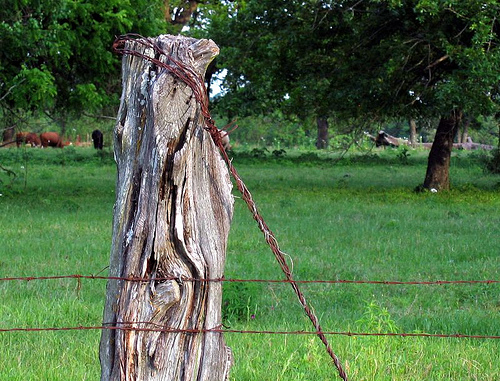
Barbed wire fence, Texas farm scene
(*photo
credit)
September
17, 2009 Citizenship Day and Model Citizens
This is
Citizenship Day, and an opportunity to list the duties we
have as citizens and recall the model citizens in our American
history. Looking about for current good citizens can be difficult.
I suggest two books on early Americans: The Son of Thunder:
Patrick Henry and the American Republic by Henry Mayer, and
James Monroe: the Quest for National Identity by Harry Ammon,
both books published by the University Press of Virginia. They
reveal citizenship during the American Revolutionary period with
little emphasis on battle reports -- though Monroe crossed the
Delaware with Washington, and took part in other campaigns. That
revolutionary period started rapidly and grew in intensity in a
short time.
Henry
and Monroe were Virginians, lawyers and farmers -- but very
different personalities. Patrick Henry was a talented poor boy who
was practical, excitable, popular, and always tending to an
evangelistic preaching style in legislative and court house
addresses. "Forbid it, Almighty God. I know not what course
others may take, but as for me -- give me liberty or give me death."
His radical firebrand nature excited the frontiersmen and the
Virginia countryside; he was regarded as a true patriot to radicals
throughout the colonies, a human catalyst for revolution and
ultimate independence. However, he was not keen on a strong central
government. He lacked the intellectual talents of John and Samuel
Adams, both of who respected his approach. However, other
traditional political figures including Virginian Tories considered
him a maverick. He was Virginia's governor for five years.
James
Monroe was a young college student from Virginia lowland aristocracy
at the time of Revolution. He volunteered for the army, became an
officer, left the service during the War, became a lawyer and
statesman and gave immense service as legislator, representative,
ambassador, secretary of state, and president. He was popular and
non-partisan and essentially was the only president elected
unopposed. He was intense, honest to the point of scrupulosity,
sensitive to the needs of others, discerning, and forward thinking
in so many ways. At first, he was similar in political philosophy
to Henry, but drifted apart with time.
In
reading these two lives, we come to appreciate the early struggles
of our republic and the credit due good citizens. Today we
desperately need the fervor of a Patrick Henry, for our nation must
move to become a full participant in a globalizing process.
Furthermore, economic interests must be tamed and controlled. We
also need the cool-headedness and absolute honesty of a person like
James Monroe. He was often not in the forefront with quotable
messages to the media, but his persistent devotion helped carry our
country through some very difficult times.
Prayer: Lord,
inspire us to be good citizens, not only at the local and national
level, but as one people on this planet. Help us to broaden
citizenship to include a global perspective.
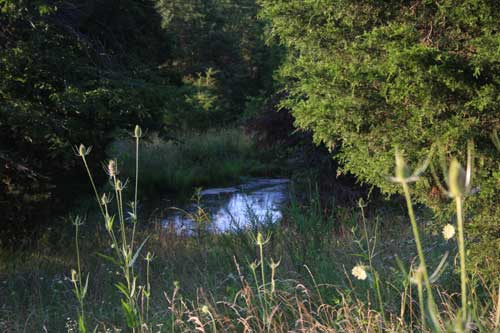
A quiet pond, rural Anderson Co., KY
(*photo
credit)
September
18, 2009 World Water Monitoring Day
Global
water resources are under threat in a number of ways and we are just
now becoming aware of the acute problem. On first glance, one asks,
"With water occupying four-fifths of the Earth's surface, how could
there ever be a water problem?" However, the problem rests with
accessible water for meeting essential needs.
With
limited supplies, matters will get worse soon. Thus water needs to
be monitored, so as to preserve higher quality and to distribute
justly the limited amounts of this high quality water. Some live a
higher lifestyle of swimming pools and lawn watering, while others
need the same water supply for irrigation or for potable water or
for livestock. Free drinking water at common village wells or
streams is now giving way to expensive bottled water that is
obtained at a price from soft drink-dispensing machines. Running
water in natural streams was always regarded as a common property,
but is no longer so: the shores or riparian rights have been
claimed as property by individuals; water rights have been allocated
to individuals or corporations.
Privatizing water becomes a profitable business where water
shortages occur. Throughout history, the public water fountains in
town squares were examples of water freely used. Now the commercial
water industry sells potable water like soft drinks; even the
plastic content and the disposal or possible recycling of the water
containers are a matter of serious ecological concern.
Throughout
the planet, water polluted in various degrees indicates that the
right to clean water has been infringed upon. Especially this is
true of those who think that they can return water in poorer quality
without compensating for damages to the commons. In the twentieth
century, horror stories about polluted water abounded: in the 1960s
the Cuyahoga River near Cleveland caught fire; India's sacred
Ganges became a sewer, downstream from a host of untreated sewage
sources; some of China's major rivers near industrialized sites were
laced with heavy pollutants; in Appalachia "straight pipes" dumped
sewage directly into waterways in the hope that "dilution is the
solution to pollution."
In
other areas heavy irrigation demand takes away access to adequate
water supplies for residents in urban areas. Rivers are drying up
before they reach the ocean (e.g., the Indus, the Colorado, the
Yellow, and the Rio Grande). The Jordan is a brackish streamlet
before it reaches the Dead Sea. Some American cities such as San
Antonio have water problems. San Antonio, which draws most of its
water from the Edwards Aquifer, is experiencing a shrinkage of the
water table with urban expansions; for every 75 gallons of
groundwater that are pumped for the city, only 60 are returned. The
world's water woes are growing by the day. Monitoring and proper
enforcement of limited water distribution is utterly needed.
Prayer: Lord, allow
us to share precious higher quality water with all, and especially
with those who need it most.

A late summer storm
(*photo
credit)
September
19, 2009 Stay Calm in Stormy Weather
"Stormy
Weather" was a musical starring Lena Horn that connected us with how
we act during times of storms, including the physical and emotional
ones we encounter on our journey of life.
Storms have
a way of focusing us quite well.
I
remember my near panic when on a trip with my parents in 1981.
While we were visiting Charleston, South Carolina, the radio
announced that a hurricane was approaching. We had wondered why the
streets became so deserted in a very short time. Like the local
inhabitants, we immediately attempted to get out of the way and let
the storm approach with all its fury. Upon saving our precious
necks, we paused and wondered why we panicked.
Recently I was visiting the local senior citizens institution, when
our local sirens were blaring about a windy condition. The staff
had moved all the residents into the hallways away from glass
windows. As I walked by, I saw panic in the eyes of many of these
elderly folks. I said, "Don't worry it is missing us," though I was
no better informed than they were. Fright is natural.
Some
people are not frightened by stormy weather and seem to glory in
getting right out in the middle of the rain and wind. Some of these
take unnecessary risks. A few such nuts just want to greet the
incoming hurricane -- even though some even put the police at risk
in trying to get them to evacuate. The resisters like to confront
the storm in all its intensity, and to consider it a thrill to live
through such an episode.
Hurricanes seem to be coming with greater frequency and violence --
and some scientists see this as a result of increasing ocean
temperature due to global warming. The culprits are ultimately
ourselves, for we use electricity from powerplants running on fuels
that result in carbon dioxide emissions. By cutting electricity
use, such as through compact fluorescent lighting, we can reduce the
need for fossil fuels and thus the resulting emissions. Yes, we
could be causing a certain number of storms, and these may hurt or
kill people thousands of miles from here. However, we seldom think
about such causes.
But
human-induced storms of discord are far more evident to us, and
these also demand our full attention. We can become the ones who
calm the storms in more directly observable ways than simply using
less electricity. When local personal storms arise, we may have an
opportunity to say a good word, to take an emotionally person aside
and cool the situation, or to get all parties to talk with each
other. We become other christs to them.
Prayer: Lord,
inspire us to start doing something about the climate changes that
we are causing by misuse of resources. Help us to be better
prepared to meet calmly the storms in our personal lives and to
assist in calming those of our family and neighbors.

Rainbow for an uncertain day
(*photo
credit)
September
20, 2009 Arrive at True Service for Others
If
anyone wishes to be first, he shall be the last of all and the
servant of all. (Mark 9: 35)
In the
Gospel of St. Mark today (9:30-37) we read of the discussion among
the disciples as to who is the most important -- a common
human thing to do among immature folks. Often we hear a similar
discussion, namely, who is doing it better.
Seeing the task ahead clearly
is the first step in giving greater service: a sick person needs
caregiving; the job must be done well; the office held must be
effectively run; the family needs to be guided. An important
service stands ready to be undertaken. We may deny it, excuse
ourselves, or seek to escape our responsibilities, or, with God's
help, we could face the task head on. It is a privilege to be born
in these times and to have the opportunity to serve in such
important work ahead of us. Granted people-oriented service is
critically needed, but where do we fit in? The goal of people
first, not economic profits, is difficult in this age where so many
strive to enhance their resume.
Knowing our talents and limitations
is required for being able to
give greater service. Often we think we can do or accomplish feats
that are really beyond us; other times we think we are not up to
the task and shirk from attempting to do what has to be done. The
answer is a humble acknowledgement of who we are -- along with a
prayerful approach to what God wants us to do at this point in our
lives. We should neither overrate nor underrate what we can do.
All of us have a noble and important mission. Finding it is finding
God in our lives. This is done through childlike trust that we can
and will do the best we can with what we have got.
Selflessness takes ongoing practice. The words of James
(3:16-4:3) prompt us to ask what are the "inner cravings that make
war within our members." This knowledge of self comes through the
practice of self-denial, something that takes time and the
discernment of spirits that tug at us from various directions. Our
deepest personal gift from God is the ability to exercise our
freedom, which is so often forgotten. To act freely in a godly
manner requires God's help through prayer, and thus we gradually
grow in other-centeredness.
God's
Will and Service. The constancy in prayer helps us in moments
of crisis or weakness to see that God is always with us. Jesus
allows a child to be the example (Mark 9:36-37), for the Greek word
for child and servant are the same; the vulnerability and dependency
of the child must be recognized, and our quest for finding God's
will is like the child's condition.
Prayer: Lord, teach
us to be people of service to others, and help us to do the best we
can in where we find ourselves. Make our service one within a
cooperative movement embracing many people working for a better
world.

A sincere expression of gtatitude, no words
needed
(*photo
credit)
September
21, 2009 Spread a Ministry of Gratitude
This
World Gratitude Day is a perfect opportunity to realize that we
often neglect to say thanks for the simple gifts of life. A
"Ministry of Gratitude" should be foremost at this time because it
is required for Earthhealing in every way. To lack gratitude is to
lack a profound respect for the resources we have and use. Thus not
being grateful leads to ideas of privilege, and to the belief that
we are deserving these gifts. Americans have used far more of the
world's resources than our proportion by population; we do not thank
but rather neglect Native Americans who welcomed us to these shores;
we have used the labor of slaves or indentured servants in the
building of our nation, giving little back in restitution; and we
forget our ancestors in the faith for their contributions to us.
Give
thanks every day. Many of us seek to be relevant or sociable or
popular. Few of us take the effort to say a profound "thanks" for
the many gifts given to us. Will we give more thanks, if deprived
of these gifts through illness, natural catastrophe or human
misdeed? That may not be the case for those who expect too much --
and the loss may trigger bitterness and anger on the part of those
who expect to always receive and never give. Rather, let us all
resolve to thank God daily for gifts given.
Encourage a "thank you." Have you forgotten something? The
reminder may be said in different degrees of humor, authority or
sternness, and may possibly sound oppressive. Maybe a small
admission that I often forget to be grateful could punctuate the
teaching moment for others both young and old. With continued
generous subsidies or charity, people tend to believe that they
deserve to receive more and more and more.
Cultivate a spontaneous and unexpected thanks.
Think of the hard work by the underpaid or overlooked service
personnel, and give these folks a nod of approval. What about the
brave souls who devoted much of their lives to religious testimony,
scientific research, or arts and crafts? What about those who serve
or have served in the military? Think of those who copied
manuscripts and literature that preserved western civilization?
What about the unwritten cultural achievements of those speaking
languages that are soon to be extinguished for lack of native
speakers? Do we recall the people who have built and are
maintaining our schools, our roads, our fire and police services,
and on and on?
Demand a public thankful attitude.
Our country and world take far too much for granted. We walk about
the beautiful and fragile world around us and forget to say "thanks"
to the Creator who gave us many good gifts worth recognizing, not
just on an individual or family level, but in public acts of
gratitude. The ungrateful should not rule the day? Omitting the
Giver of gifts, is to spread the sense that all is owed, and nothing
is deserving of thanks.
Prayer: Lord, thank
You for the opportunity to live at this time and to be of service to
the many who are in need.

Seeds of the Ozard milkweed, Asclepias viridis
(*photo
credit)
September
22, 2009 Autumnal Equinox and Peace
Fall
slips in on us. It is getting late in the year, and we may become
restless knowing how the growing season is coming to an end and
daylight is waning. Yesterday was the International Day of Peace
and today is the advent of autumn, and they are related. Sometimes
a healthy restlessness should lead to our trying to help bring peace
to what appears to be a shortening span of opportunity. Seasonal
changes and challenges extend to world conditions.
When I
was a young child, the Second World War was in full swing. I played
out the conflict by battling the knee-high wild amaranth that had
consumed my family's barn yard. This plant with its thorns covered
much of the surface of the half acre plot and was ignored by the
livestock. I would slay the plants with my stick that served as a
bomber on a hostile city -- a child's play.
Perhaps we
play around with peace in much the same way. We say "peace," but
take our aggressions out in meaningless ways not attacking problems
at their sources. Autumn reminds us that our opportunities are
finite, and we must make the best of a changing world and not by
meaningless child's play. We must seize the moment and act
accordingly. As a nation we are fighting two seemingly interminable
wars; we need to pray for peaceful solutions on a host of fronts,
or otherwise our economic and psychic resources will be drained away
in meaningless actions.
We must
give peace a chance, but how? Let's give special attention to our
privileges that go unchecked: squandering world resources; a
military industrial complex that saps our resources; lack of health
insurance on the part of 45 million people in our country; and a
billion hungry people on this planet. We protest that we are not
wanting to be "warlike," but are we? Can we Americans find the
opportunity to transfer some of our half-share in the massive global
annual $1.5 trillion military budget to bringing about peaceful
solutions to the world's problems?
Should
one billion hungry people disturb our autumn rest? Transition to
peace is needed. We cannot rest when our fellow brothers and
sisters in any part of the world are lacking the essentials of life
-- the homeless, the ill, the hungry. We do this as a people when
we permit the few untaxed privileged to have so much, and to do what
they want to with what they have. The gulf between rich and poor
haunts us, and well it ought. Furthermore, we seem to lack the
proper approach to peace on another front, namely the planet
itself. We make war when we allow global warming or when we permit
the importation of exotic and potentially invasive species. We also
do so when we permit conditions to exist that threaten or extinguish
our native plant and animal species. War does not just occur
between human beings, but by humans on plants and animals and the
Earth itself.
Prayer: Lord, give
us peace in our hearts and minds so that we might resolve to help
give peace to a troubled world.

A coal plant in Muhlenberg Co., KY, near Paradise
(*photo
credit)
September
23, 2009 A Critical Look at King Coal
Coal is
a major energy use in this country and in other lands such as China,
where it is the source of most of that nation's electricity.
Although plentiful and relatively cheap, this carbonaceous fuel has
proved worrisome in the global attempts to cut carbon dioxide
emissions that are causing dramatic climate change. Add to this the
well-known ill effects of coal extraction. These range from deep
mine safety issues and worker health, to land and water effects
resulting from strip mining and more recent mountaintop removal
practices.
Many
Appalachian landholders sold to coal companies "broadform deeds"
years before the strip mining operations, as they thought that coal
companies would extract the coal through deep mining practice. To
their surprise they found that the deeds allowed coal companies to
move in with earth movers and destroy their community and sometimes
even their homes. In the 1960s, the Widow Combs chose to stop the
bulldozers by lying down in front of them at her home. She was
forcefully removed to allow the coal on her property to be strip
mined. Three decades later that Kentucky broadform deed permission
was revoked. The late writer and friend, Harry Caudill, in his
book, Night Comes to the Cumberlands, documented a host of
abusive practices caused by coal extraction, which harmed his
people.
Truly
king coal is a mixed blessing. Some call for business as usual with
a few additional regulations; others call for less polluting coal
combustion methods or sequestering the emitted carbon dioxide by
pumping it into abandoned sealed mines; still other seek the
elimination of this energy source altogether.
The
importance of this fuel at this time will make the last of these
highly unlikely in the near future. Three trains with about 110
cars each, filled with coal, sit within sight of where I am writing
here in Ravenna, Kentucky -- a longtime coal rail center. This is
coal headed for powerplants in Georgia and Florida.
Can
anything be done about king coal? In early public interest work, we
publicized coal's environmental effects, including recommending
proper blasting regulations in comprehensive national reclamation
legislation. Regulations, such as land reclamation requirements,
are only partly successful given the volume of coal removal. Merely
documenting current mountaintop removal practices has some salutary
effects, but it also arouses emotions of those miners who make a
living extracting coal. Non-fossil fuel energy alternatives (wind,
solar, geothermal, etc.), along with energy conservation, are the
only long-term solutions -- but they are perhaps years in the
offing. All the while, as long as coal remains king, both in
America and in other major industrialized nations, the planet will
suffer from the emissions.
Prayer: Lord, give
us the courage to speak out and debunk the regal nature of coal,
even for those of us in this heavily coal-mining region. Help us to
promote renewable energy sources.
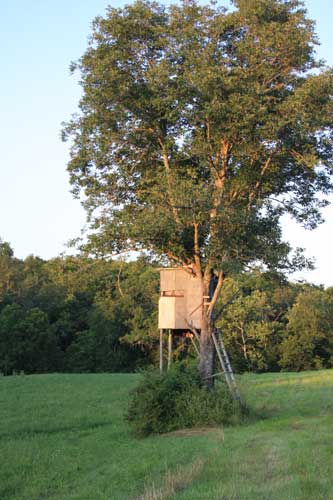
A constructed hut used for a hunting blind
(*photo
credit)
September
24, 2009 Are Hunting Days Numbered?
With
guns sounding outside during this squirrel season, I wonder once
again about the sport of hunting. We have made a distinction
between the sport and the necessity of hunting to obtain food
essential to life (see November 6, 2008). Why kill the squirrels
for they are not pests and are graceful to behold? I ask fewer
questions about fishing, for a caught fish can be returned to the
water; furthermore, fish are less sensate than higher mammals (a
weak argument), fish is nutritious and easily prepared, and fishers
do their thing to escape from stress.
Hunting
is different, is dangerous, and is losing its popularity today.
Reasons for fewer hunters include: the bother in acquiring gear and
licenses and travel difficulties in reaching wildlife; the dangers
posed by guns especially when one is not familiar with them; and,
more importantly, increasing peer pressure in favor of wildlife to
live undisturbed. What hunter wants to brag to an animal lover?
Even parading down main street with a bagged buck on the truck is
becoming less popular (no one does this with fish). The wildlife
trophy is less respected -- and often downright opposed by home
dwellers who are not afraid to voice their dissent. Wildlife lovers
and hunters simply do not mix.
A while
back, hunting was a rite of passage for youth in which elders played
the role of mentors. Hunters were to obey local regulations, obtain
proper licenses, manifest care when near other people, respect
private property, prepare and consume what was killed, and justify
the sport. However, hunting is becoming a dilemma, and I admit the
hunting ambivalence prevailed during my life. We always had enough
livestock to butcher for meat, though I knew folks who needed what
they hunted for their sparse table. When wildlife is a necessary
source of food, hunting is serious work. As kids we "hunted" crows
(aggressors in our corn fields); we held the right to bear arms and
defend crops as constitutional.
However, hunting crows took skill; rabbit-hunting was child's play
at best and unnecessary cruelty at worst. With time, I have come to
challenge sportspeople who hunt only for pleasure: they can be
dangerous to themselves and others; often they trespass; they can
tear down fences; and they foster aggressive behavior. Wildlife is
generally under immense stress, and cannot tolerate hunters with
destructive practices. Some poor folks need wildlife to supplement
their food supply. Many regard "meat" and "meal" as synonymous.
Their low-cost meat supply is locally grown wildlife. If we eat what
is around us, we truly become "Kentucky" or wherever we live. Local
wildlife is nutritious, organic, homegrown and relatively
plentiful. Deer, rabbit, geese, and turkey proliferate for lack of
native predators, and sometimes need to be culled by hunters. The
meat product has no antibiotics or growth hormones, and it takes no
effort to raise wildlife. Eat local products! If not needed for
food, let wildlife alone.
Prayer: Lord, teach
us all to respect wildlife.

Vivid colors of a Navajo blanket
(*photo
credit)
September
25, 2009 Observe Native American Day
On
this special day when we honor our Native Americans; we recognize
their gifts and traditions, for these people have given much to make
our country what it is. We note that almost half the states names,
along with the names of many lakes, rivers, mountains and smaller
regions are or are derived from Indian names. The history of past
interactions between whites and Native Americans, from colonial
times until now, is certainly not perfect: broken treaties, take
over of lands, forceful removal of tribes from east of the
Mississippi, the deliberate destruction of bison needed for food
supplies, denial of voting privileges, exploitation and pollution of
reservation lands.
Most of
the indigenous people greeted the very first explorers, fur traders,
and settlers. However, unintentionally those first contacts resulted
in transmittal of diseases to which the natives had no immunity.
Some estimate die-offs of over ninety percent of the 1491 population
though these contacts. With time and emerging conflicts, a general
Native American resistance to white incursions developed and led to
fierce struggles with early homesteaders and settlers. Amid the
onrush of white settlement, the native residents were pushed back to
limited reservations, generally on less desirable lands. In some
cases the tribes simply disappeared, while in others they were
removed to Oklahoma or western reservation areas. When gold was
discovered in the Black Hills, the "worthless Indian land" became
valuable and the Sioux had to retreat. Energy projects in recent
years have targeted nuclear wastes on Shoshone land, uranium mining
on Navaho reservations and now nuclear powerplant construction on
Native American land. The exploitation continues.
Amid
injustice, Native Americans have given our country much to be
thankful for: from approaches to treating the environment to ways of
democratic governance; from moccasins to canoes; from turkey,
cranberries, squash, tomatoes, corn, and pumpkins to ways of
fertilizing soil and using native plants for medicine. The manner
in which the Native American has treated land is well worth
understanding and imitating, as is the Native American respect for
all plants and animals. Even our thanksgiving and respect for
resources have come in part through Native American influence.
With
the pervasive influence of English in Native American areas, today
we note that preserving Native American languages is a challenge. If
actions are not taken soon, many of the Native American languages
will be among the global endangered language "species," which are
dying at the rate of one every two weeks. The last Delaware
speaker passed from this life a few years back; more such tales
will be told in the coming years unless a positive effort is made to
preserve native American culture. Are we willing to devote
resources to preserving what is valuable to these people?
Prayer: Lord, help
us to respect and preserve the Native American culture that is a
precious American collective heritage.

A covered bridge in Mason Co., KY
(*photo
credit)
September
26, 2009 Recovering Covered Bridges
A few
years back (9/22/05) we posted a photograph on this website that
precipitated a number of comments from viewers; these liked the
idea of texts being accompanied by pictures -- a union of words with
picture. From this developed the sizeable effort it takes our web
manager, Janet Powell, to select and post pictures for every daily
reflection (beginning in April, 2007). To date we have posted about
950 photographs some with variations of the same theme, but many
from all scenic parts of North America.
Let's
return to the covered bridge, a sight so familiar in my youth that I
overlooked its uniqueness. Today, few remain in the rural parts of
Eastern America and especially in the Appalachian portions of our
country. As bridges need repair, these antique bridges have been
torn down and replaced by wider and more sturdy concrete structures
-- the only kinds that modern road builders would dare undertake.
The heyday of the "covered bridge" was the early nineteenth century,
and it was not because carpenters wanted to get into the
bridge-building act. Such bridges did protect bridge flooring and
structural timbers from the elements, but the true reason, my Dad
confided to us, was that horses are frightened when crossing
bridges. Many buggy riders with skittish horses had to blindfold
their animals, and lead them across the span because of the fear of
heights. The covered bridge seemed safe to most horses.
Pictured here is the Valley Pike Covered Bridge, across a tributary
of Lee's Creek near the Valley Pike Road in my home County (Mason)
in Kentucky. It is 34 feet long, 15 feet wide and 14 feet tall, and
was built in 1864 and rebuilt in 1972; it is the only
privately-owned covered bridge left in Kentucky. Twelve others are
owned by highway departments; seven of these bridges are in the
Buffalo Trace region. Other states such as Pennsylvania and West
Virginia also have existing examples of covered bridges.
My
favorite is the Goddard Covered Bridge in Fleming County, Kentucky,
near State Route 32 southeast of Flemingsburg; it is the oldest
(1820) and connected with wooden pegs. I can still remember the
thrill of crossing that structure by auto years ago. It is in a
beautiful setting with a white church in the background. It bears
the hoof marks of Colonel Everett's cavalry unit of Morgan's
Confederates when they raided this part of Kentucky in 1864. Let's
hope these surviving covered bridges remain and retain the markings
of our collective heritage.
Prayer: Lord,
assist us to be bridge builders and preservers, to span the dangers
that divide so many of us, and to provide a cover for those who
bridge differences and continue to serve others as caregivers in
their lives. Never allow us to forget that bridges make this world
civilized, and add flavor to our culture and life.

Bergamot (bee-balm), Monarda fistulosa
(*photo
credit)
September
27, 2009 Find
God and Good in All
Anyone who is not against us is for us.
(Mark 9:40)
This
expression by Christ is far superior to a saying that those who
neglect to bless us are cursing us. We are to have an open-minded
approach to all God's gifts, whenever and wherever expressed, and to
thank God for these gifts given to others at unexpected times and
places.
We need
to find a faith in the future among all people, even when the
content of faith is unspecified. Without this faith the world
cannot move forward, and the general accepted policy will prevail,
"Let's use it up for tomorrow we will die." Those who neglect to see
any future for Earth herself (even some self-styled Christians), are
in the company of the disbelieving. It is imperative that we reach
out to all who show in their words and deeds that they want
something for the future generations. This means that we must look
out to all, and thus the Good News is to be spread in order to find
companionship at this critical hour.
Earthhealing involves looking about for kindred spirits, for we need
the support of others in order to bring about change in the world.
There are perhaps a great number who will form a broad-based
community with those who want to heal our wounded Earth. Naysayers
often speak the loudest and draw the most attention. If their
voices are allowed to go unchallenged, an atmosphere of negativism
will arise like a mist and dampen the spirits of all. That is why
spreading the Good News is really allowing people to proclaim that
God is in all creation. It is not that Earth is to be destroyed,
and we accede to the inevitability; rather we are to help save
Earth for an eternal glory. No one knows for sure how this will
happen. It is simply not fitting that we allow this fragile and
beautiful Earth to die after so much effort has been expended to
enhance it.
In his
"Ethics for the New Era," theologian Leonardo Boff says no society
lives without an ethic. He says how impossible it would be in our
religiously fractured world to expect an ethic founded on
religion. The Greek ethic founded on reason does not
include the pre-rational (emotional) or post-rational (aesthetics
and the spiritual experience). A third source is an ethics of
desire and we have seen how undefined and diffused this is
(e.g., the desire to conquer the world and a form of capitalism that
seeks to satisfy all desires). Thus we seek a fourth source,
caring, founded in sensible reason and its rational expression,
responsibility. This source is linked to life and is imperative and
the ethics of a new era. What we are calling for in a "faith in the
future" is one where the elements of life, care and responsibility
come together. We must find the good in all, and thus we agree with
Boff.
Prayer: Lord, we
come before You shaken by the awesome tasks before us. Our
responsibility is to save our wounded planet, and we need help.
Inspire us to become caring, earthhealing people.
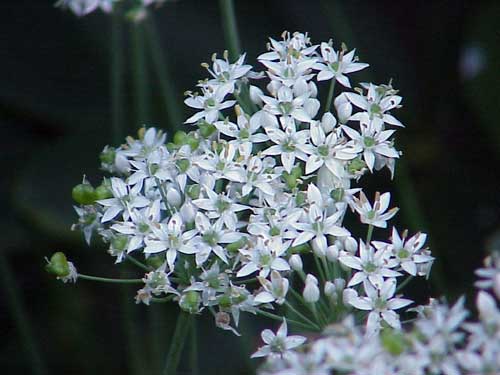
Lovely flowers of garlic chives
(*photo by
Sally Ramsdell)
September
28, 2009 Climate Change and Copenhagen
Something must be done. The UN Secretary General is talking in
apocalyptic terms. The global weather has been getting warmer; ice
caps are melting rapidly; scientists tell us that climate change is
occurring at a faster rate than previously indicated. Look about
and see; stop and listen to what the wise are telling us. Step into
a greenhouse, and notice how captured sun's rays converted to heat
waves can't easily escape; the room warms. We notice the same
effect in a parked automobile. This extra heat can be utilized
within solar greenhouses and cold frames (see September 8, 2008).
However, the same warming effect occurs through increased
concentrations of carbon dioxide and several other gases such as
methane, which find their way into the planet's atmosphere. As
levels of these gases rise through increased human industrial
activity, especially fossil fuel powerplants and combustion engines,
we can expect more rapid climate change.
Many
scientists say that a relatively small average temperature rise of
one to two degrees would cause major climate changes; now new
studies show the changes could double the size of that rise, and the
result could be catastrophic in a few decades. Glaciers in higher
elevations in Europe, Asia and the Americas, and the Antarctic ice
cap are all melting. This, in turn, is causing the oceans to rise,
thus affecting lower lying regions such as some of the small island
nations in the Pacific Ocean, as well as the densely populated
low-lying Bangladesh. That crowded nation could lose half its land
mass, if the oceans continue to rise at current rates for the next
seventy years. Climate change also could result in some areas
getting drier and others flooding, and some shifting to semi-tropic
zones, and others losing permafrost and releasing methane. All
countries will be affected in some ways. We all must act together
to change our lifestyle habits in many ways.
In
December of this year the climate change experts will assemble at
Copenhagen and reconsider the United Nations Framework Convention on
Climate Change. This is a follow up to Toronto (1988), Kyoto
(1997), and Bali (2007). Are the developed and developing worlds
willing to sacrifice for the common good? It is an open question.
One approach is some emissions trading, an unfair and ineffective
practice in which the "right" to pollute will be given to some
get-rich traders. A far more just approach is to accept that
everyone on this planet must first have the resources to exit
poverty -- and the poor could be exempt from emission targets.
Responsibility for climate action is allocated to countries based on
how many of their citizens are above the income threshold, how far
above it they are, and how much greenhouse gas that country
produces. (New Internationalist, January-February, 2009, p.
20-22).
Prayer: Lord, open our eyes to see what is occurring around
us; open our hearts to be willing to change and to share resources
with others; open our leaders' minds to fair and effective arguments
that will be made at Copenhagen in December.

Beechy, teaching us how to relax
(*photo by
Sally Ramsdell)
September
29, 2009 Appreciate Teachers
The
challenges we face today in a rapidly changing world require the
best in mentors. These prepare us for the service we are to render
in life. Perhaps all of us take our teachers either past or present
for granted. Maybe a little appreciation is due, for that is
gratitude for those who gave us the enthusiasm, repetition and
patient work it has taken to make us who we are. At times we think
we deserve what we get, and never see that the efforts of others are
so very critical. Perhaps part of our reluctance in extending
appreciation stems from realizing that we have not lived up to our
teachers' expectations of us.
*
Say "thank you," while there is still an opportunity. Better
yet, teach those with whom we are associated to say thank you to
God, and to our former and current teachers.
*
Support teachers. Often I find competing groups want one area
of teaching to be financially supported to the neglect of another.
All honest and dedicated teachers need recognition for their
efforts, as well as the support of the community. We need to show
we are behind them. They preserved their enthusiasm, even when the
students were anxious to move on to other things; they overcame
obstacles in resource materials and unruly students; they were tired
from work, but seldom showed it in the classroom.
*
Promote teaching. Even those of us who are not intending to
teach should realize its value, and be prepared to interest others
in taking this as a meaningful and noble profession.
*
Recall with happy memories. I dedicate this to the teachers of
my life for this is most fitting. As I mentioned at the first of
the month, my first and second grade teacher, Sister Imogene, a
Clinton, Iowa, Franciscan, passed on to the Lord at 103 years in
2005. She said she remembered every face even when she had
difficulty with names. This religious community taught us in the
spirit of St. Francis to respect the things around us, and
especially our environment. They launched us on our life's journey,
dedicating themselves with little expectation of earthly praise or
financial rewards.
Recognize the power of teaching. Teachers appear to be master
recyclers. They truly believe that the enthusiasm that they exhibit
will be repeated by that next generation, when their charges grow up
and mature as teachers themselves -- whether professional teachers
or teaching in some fashion at home or work.
We need to
realize that teaching is an integral part of extending civilization
-- a delicate flower needing continued nurturing.
Prayer: Thank you, Lord, for allowing kindly and patient
teachers to sacrifice for us, to give of their enthusiasm, and to
change us in little or bigger ways. Thanks for the chance to extend
what teachers did for us to those under our influence.

Surprise... an autumn treat: ripening chestnuts!
(*photo by
Sally Ramsdell)
September
30, 2009 Learn Something New Every Day
Last
week, I attended the monthly herb garden gathering in our county,
and we heard some good discussion of methods of canning and
preserving the produce we have in such abundance this year. I
learned something new. What about today on my birthday? Will I
learn something new again, and something new tomorrow? Well that is
my current intention but it is a challenge for an old man.
While
in my thirties, I figured that the average life span was about 72
years. Why not divide 12 months into that 72 and allot every six
years a "month" in my life. Thus January is age 1-6, February 7-12,
etc. When in the spring time in life, this was a fun exercise --
and age 72 years a great distance in the future. Time flew by and
the game became less interesting. Autumn appeared a little past
fifty years with gray hairs and with a sense of melancholy
foreboding that the hour glass was running lower on sand. By the
"December of life" I was ready to change the rules. Early life is
short and only a preparation for the advent of eternal life. And
life expectancy is more than 72 now.
At 2:00
a.m. on each birthday (my general waking hour) I thank God for
giving me the chance to be of service for another year.
The average
American male now lives to 77, and this is the beginning of that
seventy-seventh year of my life. What does it all mean anyway? God
is the author of life, and what we are given is a gift that we must
use properly and creatively. None of us are average people, and
thus we must see our lives as unique, as special, as worthy of
creative response and cooperation with God. Today is a day of
gratitude for the opportunity to serve and realize that this should
be done every day.
The
point is not that now I have reached the average age and the rest is
"borrowed" time; all time is "borrowed" -- and we make the best of
what we've got. We also look back with regrets for not using the
past more perfectly, but even those imperfect times were part of the
experience that we now have that will help us to make the future a
little better -- however long it may be. In fact the game of
allotting time for the seasons of our lives cannot be fully
calculated until we die, unless we know for certain our execution
day. I am unsure whether such a game should even be recommended,
for God is the author of all life.
Beyond
game play we could discover that recognizing our age as a gift does
have value: we become aware of time as God's gift; we realize how
our lives change like the seasons; we see ourselves as mortal, as
limited in the time we have, as willing to make the best of what
remains, and as undeserving of any part of a long or short life.
Prayer: Lord, we thank you for the gift of life, the time
already given and the time that remains. We ask you to help us see
every day as an opportunity for being and doing something new. |